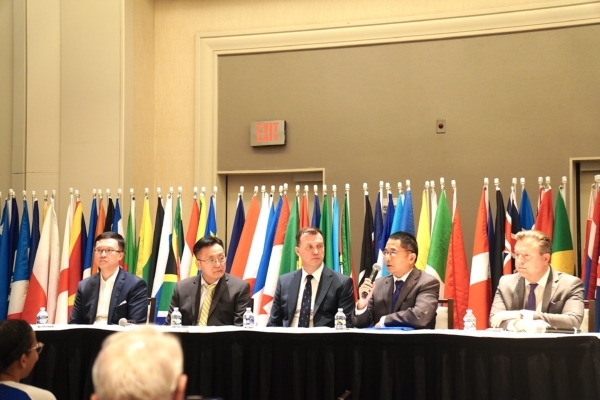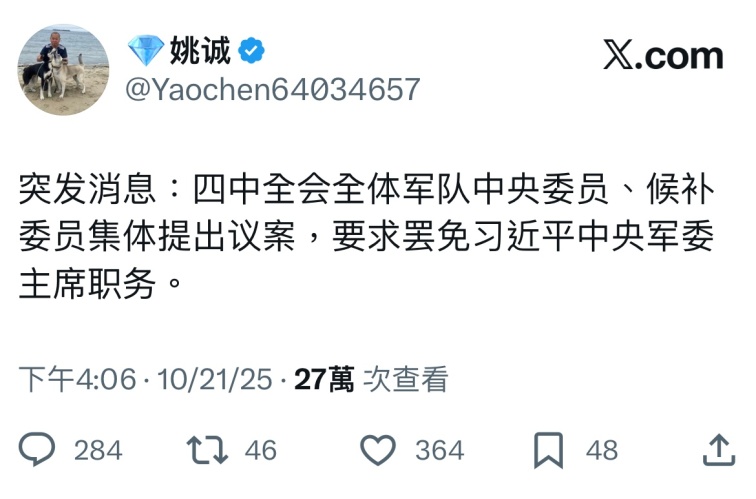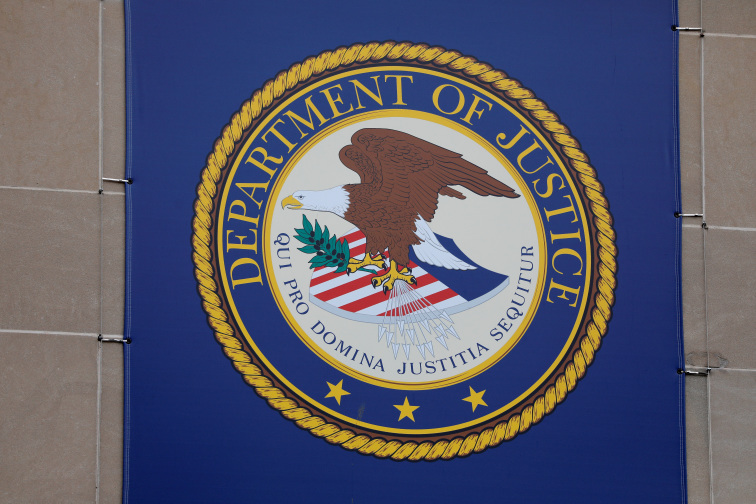During Beijing’s September 3rd military parade, Xi Jinping and Vladimir Putin discussed immortality and organ transplants, shocking the public. (Screenshot from NTD video)
[People News] The four-day Fourth Plenary Session of the Communist Party of China has now entered its third day. The reports from the party media appear somewhat peculiar. Today (October 22), Xinhua News Network continues to indulge in lengthy fabrications regarding the '14th Five-Year Plan' and a 'favourable situation'. Aside from the headline urging the world to 'see confidence', the rest of the content surprisingly remains largely unchanged from yesterday; while the 'People's Daily', apart from its headline praising Xi in a high-handed manner for 'the new era has embarked on another magnificent journey', contains little else related to the plenary session. People's Net has even shifted its headline to discuss the Canton Fair, completely omitting any news about the plenary session.
Meanwhile, overseas, most media outlets are focusing on rumours regarding personnel changes among the Communist Party's high-ranking officials.
Reports suggest that Xi Jinping has been asked by representatives of the entire military to relinquish his position as chairman of the Central Military Commission, with Zhang Youxia poised to take over the role.
Additionally, there are claims that four members of the Politburo Standing Committee and three members of the Politburo from the Xi faction have voluntarily resigned. These individuals include Li Qiang, Cai Qi, Wang Huning, Li Xi, Li Ganjie, Ma Xingrui, and Huang Kunming. Wang Yang is expected to be added as a central committee member. The new list of Politburo Standing Committee members reportedly includes Wang Yang, Hu Chunhua, Zhang Youxia, and Chen Jining.
These reports primarily originate from notable informants, including former Chinese Navy midshipman Yao Cheng and self-media commentator Xiaoshuojia, among others. These two have frequently provided insider information about the upper echelons of the Communist Party in the past, many of which were later confirmed by the Party, thus lending them a degree of credibility. However, this time, the author believes that a rational analysis and careful observation are still warranted.
The Chinese Communist Party (CCP) has consistently emphasised that power is derived from military strength, with the party at the helm of all affairs. If Xi Jinping's position as Chairman of the Central Military Commission is succeeded by Zhang Youxia, it would create chaos in military leadership unless Xi also steps down as General Secretary. Such a scenario would contradict the violent and oppressive nature of the CCP.
Historically, from Mao Zedong to Jiang Zemin and Hu Jintao, no leader has dared to allow military power to operate independently of the party. For the CCP, while internal conflicts may arise, any threat to the party's survival unites vested interest groups, who view this as a matter of life and death and the preservation of their generational interests. Therefore, it is inconceivable for them to publicly display division or infighting to the outside world.
During Deng Xiaoping's era, there was a brief period when the General Secretary and the Chairman of the Military Commission were held by different individuals. When Hu Yaobang and Zhao Ziyang served as General Secretaries, Deng was the top military leader. However, Deng's leadership was covert and internal, never made public or formal. As a result, both Hu Yaobang and Zhao Ziyang faced tragic fates, either dying or being placed under house arrest, with no favourable outcomes.
Another notable period was from 2002 to 2004, when Hu Jintao was General Secretary, and Jiang Zemin held the position of Chairman of the Military Commission for two years. This was a power grab by Jiang under the guise of 'helping someone up the sedan chair for a journey.' Although it was labelled a transition, Jiang Zemin was effectively involved in governance through proxies such as Guo Boxiong, Xu Caihou, and Zhou Yongkang.
If Xi Jinping were to relinquish military power, it could indicate that he has already been effectively sentenced to death by fate, with a possible reprieve of six months to two years. In that case, the Chinese Communist Party (CCP) would need to prepare for the aftermath. There are rumours that Hu Chunhua is set to become the vice chairman of the Military Commission, and after two years, he may ascend to the position of chairman of the Military Commission and General Secretary. This scenario is plausible. After all, whether Xi lives to 150 or 70, he is still considered immature, as the saying goes, '吐癢吐森破' (implying a lack of maturity).
The resignations of Li Qiang, Cai Qi, Wang Huning, and others appear to come without warning or explanation. If Xi were to allow seven key officials to resign voluntarily, it would be akin to striking at the very heart of the CCP. This chain of events suggests that the entrenched interests within the CCP are acutely aware of the significant external repercussions and internal upheaval that could follow.
Moreover, these rumours reflect a growing public sentiment: people are increasingly disillusioned with the CCP, wishing for internal conflict and eagerly anticipating its collapse to usher in a genuinely new China.
In stark contrast, reports from within the Great Firewall are notably bleak. Due to the CCP's opaque and tightly controlled system, the details of what transpires in closed-door meetings remain a mystery to the outside world. Thus, while events may unfold in unexpected ways, they could also spiral into further darkness and chaos. The spectators can wait another day to see what happens; we will analyse the situation then.
(People News first published)
△











News magazine bootstrap themes!
I like this themes, fast loading and look profesional
Thank you Carlos!
You're welcome!
Please support me with give positive rating!
Yes Sure!